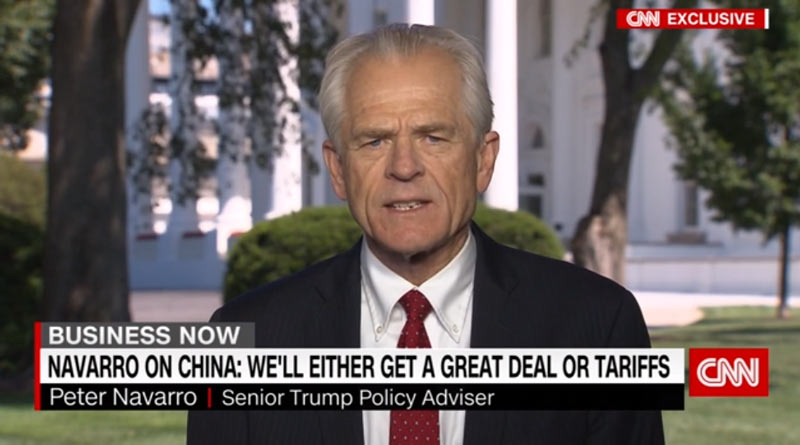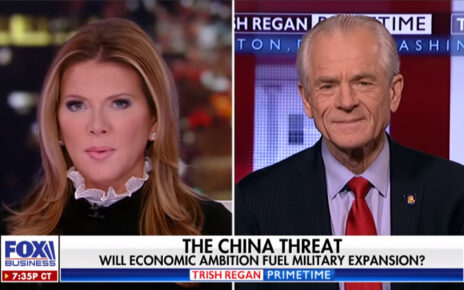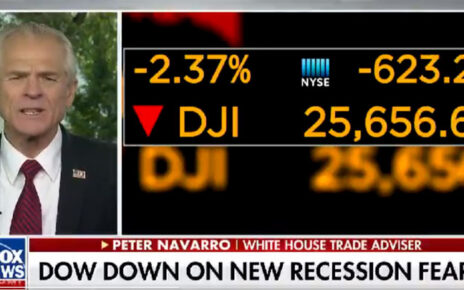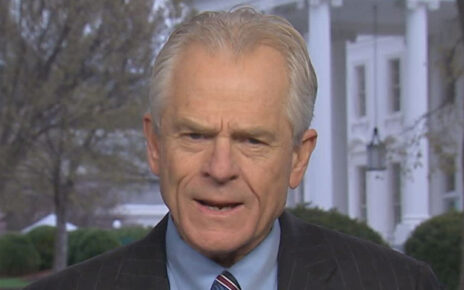CNN Business Now | CNN Business
CNN’s Richard Quest has the day’s top business headlines after the Closing Bell on Wall Street. (June 11, 2019)
June 11, 2019 – CNN, Quest International
TRANSCRIPT
QUEST: So I’m joined for an exclusive interview by the White House’s foremost advocate on trade and tariffs, Peter Navarro, an assistant to
Donald Trump and the Director of Policy of the Office of the Fair Trade Policy at the White House.
Peter, good to see you, sir. Thank you for giving us time.
PETER NAVARRO, DIRECTOR OF POLICY, OFFICE OF THE FAIR TRADE POLICY: It’s been too long, sir. I remember during the campaign, your wonderful studio there, I don’t know you paid, but that studio is the best in New York. Apologies to everybody else, but I loved that then.
QUEST: And our new one is even better, you have an open invitation to come and visit. Now, on the question of Mexico and the trade tariffs. The
decision to use tariffs has been widely criticized as taking tariffs from an economic tool to one for immigration and thereby other purposes.
NAVARRO: So what we have unquestionably at the border is a national security and an emergency. What we have is a situation where Congress has
refused to act and prior to last week, Mexico had refused to act.
It was totally appropriate to use the International Emergency Economic Powers Act in the way that President Trump did. And as President Trump has
correctly said, Mexico refused to do in 20 years what it only took about two days to get us to do with the prospect of tariffs.
We see it — the tariffs, Richard have multi uses. In some cases, they are simply a defense of our national security, for example, in the case of
steel and aluminum tariffs, a similar use is in China where we’re trying to defend ourselves against practices, like forced technology transfer,
intellectual property theft, the use of unfair subsidies in state-owned enterprises.
And in the Mexican case, clearly, this was an appropriate regulatory response to a terrible situation and we got a great outcome out of it.
QUEST: Okay, but it is what is being described as the weaponization of tariffs. You’re taking them and essentially bullying another country on
the threat of a tariff.
NAVARRO: Those who are using that term are simply those who are opposed to our policy in general. It’s the Chamber of Commerce, it’s the
multinational corporations. It’s the anti-tariff crowd who have seen our jobs go offshore and have American use as what President Trump has
correctly called the piggy bank for the rest of the world.
So that term — look, throw that away. What I see today behind me is a beautiful weather and a lawn at the White House, a very bullish economy.
We’ve got seven million jobs out there available for Americans and only five million people seeking jobs.
We’ve got an epic low unemployment rate. We’ve got investment pouring into this country.
[15:05:10] NAVARRO: This is bullish and tariffs are an important part of the President’s strategy to bring about the economic renewal and
manufacturing Renaissance were seen in this country.
QUEST: Some people suggest the President doesn’t fully understand how tariffs work. Well, let me read you —
NAVARRO: Come on now.
QUEST: No, come on.
NAVARRO: He is smartest guy in the room. He is the smartest guy that is sitting in the Oval Office on the economy and business in a hundred years.
I can’t think of anybody who is smarter than he is on this show. I’m not going down that road with you.
QUEST: Well, he says, we have so much money that is pouring into our Treasury right now.
NAVARRO: $17 billion we have raised to date on the tariffs. And by the way — by the way, the people who are paying those, that money are the
countries that tariffs are levied against.
China clearly bears the burden of the tariffs. They bear most of the burden in the form of lower prices for their products. Fewer exports lower
profits. The Chinese government itself is having to devalue its currency out of desperation.
We have the Chinese government that is facing lower tax revenues. And meanwhile, I would point out in Q1, we had a 3.2 percent real GDP growth
rate. And guess what? A full one point of that was due to our reduction in the trade deficits primarily because of the China tariffs. Tariffs are
good.
QUEST: You accept that the strict operation of the tariff is paid by the importer, which is then just passed on to the distributor, and ultimately,
the American consumer.
NAVARRO: Now, of course, come on, you know, better than that. This is a task in what’s called tax incidence analysis. Let’s say for example, I’m
an American consumer, I pay $100.00 for a product from China before the tariff, if I’m still paying $100.00 after the tariff, it’s because China
has lowered their price and bitten that bullet and devalued their currency. In that case, I, as an American consumer didn’t pay a cent more.
QUEST: Correct, but the evidence is —
NAVARRO: There is no inflation in this economy.
QUEST: The evidence, Peter, is that one of two things are happening, U.S. corporations are cutting margins to account for that tariff or they are
passing it on.
NAVARRO: Not U.S. corporations my friend unless they’re setting up in China and selling back here, which we don’t want to happen — bring your
jobs home.
But if it’s a giant corporation, we’re not shedding any tears for a China corporation that uses all sorts of government subsidies to dump products
into this market.
Look, here’s the thing. China is paying for the China tariffs not American consumers. There’s no inflation in this economy. We’re in a virtuous
cycle. This is why things are so bullish. And the stock it is reflecting that.
QUEST: All right, let’s talk about China, what might happen next? Please, I know your time is tight. But please have a listen to what the President
said today. And we can discuss it after. Have a listen, sir.
(BEGIN VIDEO CLIP)
TRUMP: Right now, China wants to make a deal very badly. It’s me right now that’s holding up the deal. And we’re going to either do a great deal
with China, or we’re not doing a deal at all. Right now, China is paying us billions and billions of dollars. They never gave us 10 cents. And
China ate our country alive during Obama and Biden.
(END VIDEO CLIP)
QUEST: What are you now waiting for from the Chinese to do the deal? The President said he is now the one that is waiting. Waiting for what?
NAVARRO: Well, look, you know, the history of this, we go back to Mar-a- Lago at the beginning of this administration. We’ve given the Chinese many, many opportunities to negotiate in good faith.
And we had 150-page plus agreement across seven verticals, including the forced technology transfer and the intellectual property theft, and they
reneged on that at the end. So that’s where we are.
I don’t want to say any more than that, other than to say that we’ve got the President of the United States is the best negotiator in the world,
with a left-handed in Robert E. Lighthizer as the USTR, as the finest negotiator I’ve ever met in the trenches, basically working with the
Chinese, and we’ll see what happens and we’ll either get a great deal or we’ll get tariffs. Simple.
QUEST: But finally, I just want to ask you, this sort of psychological, philosophical, geopolitical, whatever posh word we want to use of the
United States, using tariffs in this way, dragging effectively, humiliating Mexico, dragging them to Washington.
NAVARRO: We did not humiliate Mexico. We got their attention. We love the Mexicans. The President of Mexico and our President get along great.
[15:10:07] NAVARRO: They know that there’s a crisis. As the President said, look, they had no incentive to do what they did until we gave them
the incentive. So I mean, this tariff policy is working. It’s simply a negotiating tool that we use when we need to use it, and it’s getting
people to the table.
Look, one thing I should say, the American people are behind this President. A recent Harvard Harris poll came out just a few days ago, and
it showed that a majority of people in this country support our tariffs on China, and close to 80 percent of Republicans are behind this President on
the China tariffs.
They understand, everybody in America understands that China has been eating our lunch and raiding our piggy bank. And one of the best successes
I think of this President has been to change the narrative and dialogue on China in a mere two years. Before this, it was like, let’s engage with
China. They take our lunch.
QUEST: Peter, last question.
NAVARRO: Sure.
QUEST: You must be, I suppose impressed is the word. You came into this White House. Tariffs by and large have been a dirty word in economics
since Smoot-Hawley, you know, they’ve been very targeted. They’ve been — but now they are part, a fundamental part of the United States industrial
or trade policy. Do you take much credit for that?
NAVARRO: No, not at all. I would say in our history, sir, you go back to the days of McKinley and Jefferson and Lincoln. Tariffs were what made
this country great, and we have a situation here, where around the world, countries are allowed to systematically charge us higher tariffs.
My office, the Office of Trade Manufacturing Policy, just came out with a report, which showed that over two thirds of the time, American exporters
faced higher tariffs on their products and we charge them the same or similar products.
So what we’re trying to do, I mean, we’re for free trade, but we’re for fair, balanced and reciprocal trade. Tariffs are useful for — defense
tariffs are useful to get people to the bargaining table. The President is playing it like a Stradivarius violin right now.
QUEST: Sir, good to have you. There’s a seat in this studio, waiting for you or —
NAVARRO: It’s been too long, my friend.
QUEST: Or my threat, I’ll end up coming to visit you.
NAVARRO: We will host you on the lawn and we’ll have tea on the lawn here.
QUEST: Now, that’s a promise. All right. Good to see you, Peter, as always. Thank you.




